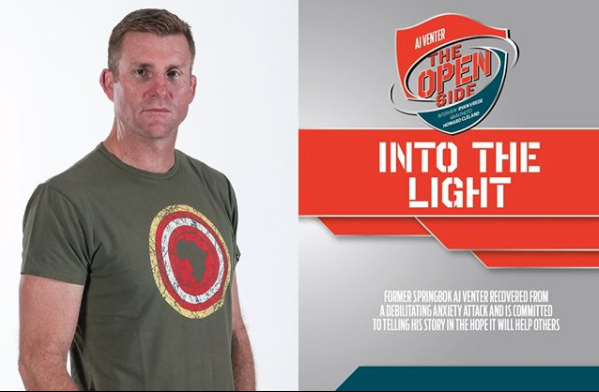In the second snippet of a feature from the latest SA Rugby magazine, former Springbok AJ Venter opens up on transitioning to life after rugby, his recovery from an anxiety attack and what he’s learned.
PART 1: Venter’s journey into the light
Why did the pressure outside rugby have such a different impact, compared with what you experienced playing the game?
Rugby came easy to me. I’m physically and mentally equipped to play the game, and I never experienced any hardship doing so. But I played until I was 35, 36. When I stepped into business after retirement, I entered a world where people had a 14-, 15-year head start on me. They were the leaders in their sectors and I was an absolute rookie. I wasn’t used to not having the confidence to do what was expected of me. I was ultra confident in rugby, but here I was struggling.
I believe the isolation of a pro player at an elite level is its greatest strength and greatest weakness. It’s a strength insomuch as you are allowed to focus solely on your craft and a weakness as you don’t really have a sense of what the real world is like. Do you agree?
Spot on. When you’re an elite player at an elite level, you earn the salary of a CEO of a big company in South Africa. Most players don’t realise this. Add to that, people idolise you, you have women throwing themselves at you, so you don’t really have to develop those interpersonal skills. When those things stop and you’re confronted with the realities of life, many players struggle. As a 22-year-old who is earning big money, you don’t think life will ever be different and that’s dangerous.
The work place has evolved into a far more employee-centred environment but in rugby there’s still a sense that players are a commodity. What was your experience?
There were team psychologists, but I think they are there for the benefit of the team more than the individual. I may be generalising and I may not have seen that at the time. Overall I think it’s critically important. If I were to do it all over again, I’d get a psychologist in my personal capacity and see them six or seven times a year to help keep me grounded and focused on what’s important in the real world.
Some players’ identity can be defined by what they do and how successful they are. Others are able to separate what they from who they are. What was your experience?
Let me answer with a story. We’ve all got egos. Imagine the ego is an onion, comprised of many different layers. Those layers are added as you go through life. Your name is a layer, your race is a layer, your social status is a layer, your language … you get what I’m saying. So your ego is formed that way. For rugby players, that layer of their ego is massive. But that isn’t real, that isn’t who they are. There’s a level of shallowness to it, but many players don’t experience it as such. To them, and to me at one stage of my life, it was very real. Now I realise how dangerous that was. The anxiety attack was a terrible experience but it was the best thing that happened to me because it gave me the opportunity to rebuild myself on my terms and with a healthier perspective on life.
This mental wellness journey can’t be easy to sustain. How do you stay consistent?
It’s been two years and, touch wood, I haven’t slid back into former patterns. I’m very aware and cognisant of my moods and thoughts. My anxiety was circumstantial, so I try as best I can to control the circumstances that were at the root of triggering my experience. Meditation is important. Many people see this as a new-age ritual that contradicts their religious beliefs. The best way to explain it is that it’s like praying, but with a scientific approach. I focus my meditation on gratitude, because that is at the heart of my ability to stay in a positive mental state.
If you had an opportunity to script a survival guide for young guys coming into the pro game, what would you include?
Obviously mental wellness is massively undervalued in pro sport. But if I’m honest with myself, when I was a youngster earning more money than most people can dream of, driving a fancy car, girls chasing me, would I have listened to AJ Venter talking about mental wellness? Probably not. So, of course those young guys need it, but I’d focus my attention more on the guys coming to the end of their career or are forced to retire for whatever reason. That post-playing period is critical.
NEW MAG: What’s in our latest issue?
Venter on…
His entrepreneurial spirit and what he is doing professionally now.
I’ve always had an entrepreneurial spirit, I’ve always been a go-getter. I’ve had to learn to be more patient in business, do more research before jumping in. But I’m grateful for those lessons, they’ve made me a better businessman and one day I’ll use that in my own business again.
I work for Itec, a great company that works in the office technology space. That covers everything from biometrics, supplying internet, offering printing solutions, telephony, video conferences systems, CCTV, anything tech related in the office space, we do.
Then I’ve got a pet project, the Life with AJ Venter podcast. There is no financial gain from that, I use it as a platform to share my story and that of others who have interesting stories in the hope that it would help people who listen.
Finally, I do talks at businesses which are close to my heart. There are many people who struggle with what I had. If I hadn’t have the opportunity to speak to psychologist Alan Kleinhans, who changed my mind over three or four sessions, God knows what may have happened. I’m not a psychologist, but if my experience and the knowledge I’ve gained from that experience can help someone move from darkness to light, that is a victory.
For those in need of assistance with any mental health issues, I’d also strongly recommend going to www.sadag.org
*This article first appeared in the May issue of SA Rugby magazine, which is now on sale.





